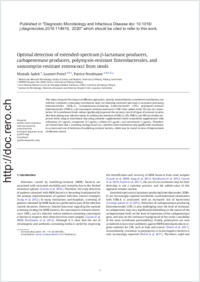Optimal detection of extended-spectrum β-lactamase producers, carbapenemase producers, polymyxin-resistant Enterobacterales, and vancomycin-resistant enterococci from stools
- Sadek, Mustafa Medical and Molecular Microbiology, Faculty of Science and Medicine, University of Fribourg, Fribourg, Switzerland
- Poirel, Laurent Medical and Molecular Microbiology, Faculty of Science and Medicine, University of Fribourg, Fribourg, Switzerland - INSERM European Unit (IAME, France), University of Fribourg, Fribourg - Swiss National Reference Center for Emerging Antibiotic Resistance (NARA), University of Fribourg, Fribourg
- Nordmann, Patrice Medical and Molecular Microbiology, Faculty of Science and Medicine, University of Fribourg, Fribourg, Switzerland - INSERM European Unit (IAME, France), University of Fribourg, Fribourg - Swiss National Reference Center for Emerging Antibiotic Resistance (NARA), University of Fribourg, Fribourg - Institute for Microbiology, University of Lausanne and University Hospital Centre, Lausanne, Switzerland
-
01.01.2020
Published in:
- Diagnostic Microbiology and Infectious Disease. - 2020, vol. 96, no. 1, p. 114919
English
This study compared the impact of different approaches, namely, nonenrichment, nonselective enrichment, and selective (antibiotic-containing) enrichment steps, for detecting extended-spectrum β-lactamase producing Enterobacterales (ESBL-E), carbapenemase-producing Enterobacterales (CPE), polymyxin-resistant Enterobacterales (PMR-E), and vancomycin- resistant enterococci (VRE) from spiked stools. The use of a nonselective 18-h enrichment broth culture significantly improved the recovery rate of all types of resistant bacteria after their plating onto selective media. In addition, the detection of ESBL-E, CPE, PMR-E, and VRE was further improved when using an enrichment step using antibiotic-supplemented broths respectively supplemented with cefotaxime (0.1 μg/mL), ertapenem (0.1 μg/mL), colistin (0.5 μg/mL), and vancomycin (1 μg/mL). Therefore, we showed here that a screening strategy based on a selective broth enrichment step significantly contributes to an increased rate of detection of multidrug-resistant bacteria, which may be crucial in term of improvement of infection control.
- Faculty
- Faculté des sciences et de médecine
- Department
- Médecine 3ème année
- Language
-
- English
- Classification
- Biological sciences
- License
- License undefined
- Identifiers
-
- RERO DOC 328486
- DOI 10.1016/j.diagmicrobio.2019.114919
- Persistent URL
- https://folia.unifr.ch/unifr/documents/308523
Statistics
Document views: 82
File downloads:
- nor_ode.pdf: 142
